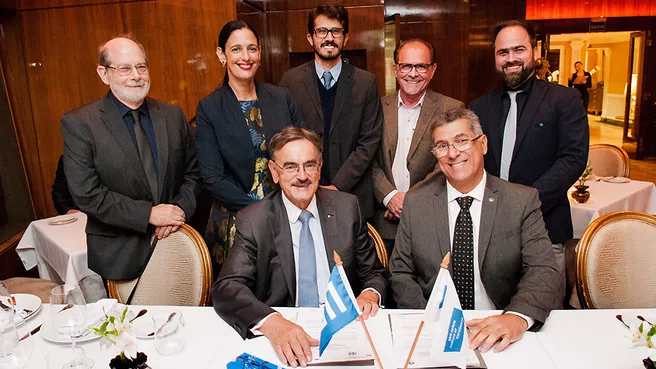Before departing on his trip to Brazil, where TUM maintains its own liaison office in São Paulo, TUM President Wolfgang A. Herrmann commented on the TUM international network policy. In the current 2020 QS World University Ranking, TUM is nationally in 1st place for the indicator "International Students", followed by the Technical Universities in Berlin, Aachen, Darmstadt and Karlsruhe.
"The 2020 QS Ranking shows that in terms of engineering and physical scientific disciplines, Germany is especially attractive in foreign countries," said TUM President Wolfgang A. Herrmann, adding that it is now important that the values embodied by "German Engineering" are vigorously applied to the issues facing society as a new challenge. "This makes 'Human-Centered Engineering' the ultimate priority for the future. Anyone who fails to actively tie in Engineering Sciences recursively with the Humanities, Social Sciences and Management Sciences will not be a modern Technical University tomorrow. This approach to thought and action therefore enjoys a central position in our university's Excellence Strategy 2019." He went on to say that it would be wise to follow the examples of Stanford and MIT, since the German Engineering curriculum is regrettably lagging behind in this respect.
30 percent of TUM students from abroad
At present almost every third TUM student is from a foreign country, while other major universities as a rule rate at significantly less than 20 percent. 22 percent of TUM scientists are from abroad, another peak value. And TUM is also far ahead of the rest of Germany in terms of student and staff mobility: Approximately 1,400 TUM members took advantage of the EU Erasmus program during the 2016–2017 academic year. During the reference year 2017 the German Academic Exchange Service (DAAD) provided support to a total of 456 TUM members, once again the highest figure for Germany, putting TUM above Dresden, Free University of Berlin, Heidelberg, Freiburg and LMU Munich.
Strong international presence
For almost 20 years now TUM has operated TUM Asia Pte.Ltd. in Singapore, which at its founding was the first foreign branch of a German university. In addition to a large number of technical degree programs, almost 100 doctoral candidates work on the CREATE Campus, a facility of the National Research Foundation Singapore (NRF), in the field of traffic infrastructure and logistics, including electro-mobility for megacities. Partnerships with international centers of education and business are established through the TUM liaison offices in Latin America (São Paulo), North America (San Francisco), India (Mumbai), Egypt (Cairo), China (Beijing), and Europe (Brussels). TUM has joined the Technical University of Denmark Copenhagen, the Technical University in Eindhoven, EPF Lausanne, École Polytechnique Paris and Technion Haifa in the EuroTech Universities Alliance.
"International character is the connection between home and the world"
"A university that wants to equip its students with optimum career preparation for the job markets of tomorrow has to think and act internationally and constantly measure its performance against the best international competitors," said President Herrmann, explaining the TUM policy. "True international character is the connection between home and the world." He went on to say that for TUM "home" is not limited to the European metropolitan region Munich, but rather also lives in regional locations such as Straubing (Lower Bavaria) and Burghausen (southeast Bavaria), each with its own academic profile. The newest location Heilbronn in Baden-Wuerttemberg is a signal that uniquely qualifying German characteristics can be made visible around the world by the alliance of first-class technology centers – above and beyond domestic German state boundaries, President Herrmann said.
